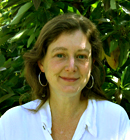Unreasonable Interactions
 Gail Wight, Stanford Art Dept.
Gail Wight, Stanford Art Dept.
gailw stanford.edu
stanford.edu
Seminar on People, Computers,
and Design
Stanford University November 14, 2008
The fine art world has traditionally been a finicky white-gloved environment, replete with security guards, alarms, and velvet-roped stanchions. As electronic, interactive, and experimental art becomes more commonplace and normalized within museum and gallery settings, the audience becomes prey to a complicated set of mixed signals. Add to this artists who often prefer working with non-conventional modes of communication and unexpected encounters, and a heady cocktail of confusion emerges.
This talk will address my long intrigue with making art in these evolving environments. Art offers no right or wrong, no specific agenda or even problem set. In fact, it tends toward provocation more than problem solving. Perhaps because of this very open-endedness, I find that new art forms offers tantalizing insights into human behavior, for better or worse.
![]()
Artist Gail Wight investigates issues of biology and the history of science and technology. Her work engages the cultural impact of scientific practice, and plays with our constant redefinition of self through our epistemologies.
Gail Wight holds an MFA in New Genres from the San Francisco Art Institute where she was a Javits Fellow, and a BFA from the Studio for Interrelated Media at Massachusetts College of Art. Wight has exhibited her work internationally, in both science and art museums. She has worked for a research project on cognition at the Massachusetts Institute of Technology, in the Exploratorium's Performance Program, and has held residencies at the Rockefeller Foundation in Bellagio, Italy, at Capp Street Project, the Exploratorium, the Albuquerque High Performance Computing Center, and Headlands Center for the Arts. She is on the faculty of Stanford University’s Department of Art & Art History, where she teaches Experimental Media Arts.
![]()
View this talk on line at CS547 on Stanford OnLine or using this video link.
Titles and abstracts for previous years are available by year and by speaker.